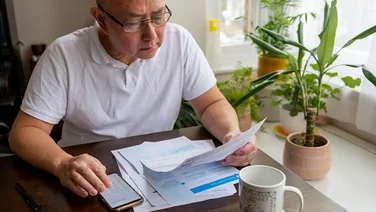We receive a small fee from trusted installers when you request a quote through our site. This helps us keep our content independent, well-researched and up to date – Learn more
- Households could save as much as £23,000 by switching to green technology
- 0.2% of total annual GDP is needed to reach net zero
- Relying on fossil fuels could cost the economy billions in the next few decades

Households could save as much as £23,000 in the next 15 years by investing in clean energy technology, such as solar panels and heat pumps, according to a report from provider OVO .
The Green Home Bonus report showed that despite the initial upfront costs of solar panels and heat pumps, households could make huge savings in just a decade, with as much as £13,000 being wiped off energy bills by 2035, and £23,000 by 2024 compared to consumers who use oil or gas.
It also suggests that failing to upgrade our homes will be a detriment to our economy in the coming decades. David Buttress, CEO of OVO, said that households will end up paying more for energy if the UK doesn’t decarbonise, with the potential cost being in the billions.
Buttress went on to say that the government’s efforts, such as its £13.2bn Warm Homes Plan may not be enough as the country is being held back by a “constant misunderstanding” of what net zero is and not enough emphasis on the financial benefits.
How much will net zero cost?
The cost of achieving net zero, Buttress said, would only be around 0.2% of total annual GDP, investment of which will mostly come from the private sector.
“We talk endlessly about the cost of action and investing in net-zero – but the real crisis is the cost of inaction, and the investment that our energy system would require even without net zero upgrades.
“We need to move away from endless debate and accept that there is a clear economic reason for moving to clean energy sources.”
These barriers are costing the general public millions every year, with 80% of UK households wanting to introduce low-carbon tech to their households.
The data, reviewed by academics from the University of Exeter, the University of Leeds and the University of Stirling, shows that over 70% of households think change is impossible with such high upfront costs, and most low-income households (92%) feel domestic green technology feels out of reach.
Dr Maximilian Gerrath, associate professor of marketing, University of Leeds, said that consumers aren’t convinced of the benefits to their bills.
“Most people don’t resist green upgrades because they dislike them – they resist because the benefits feel distant, while the costs are immediate,” he said.
Nick Davies, head of climate policy, Green Alliance, said that upgrading homes with clean tech isn’t just good for the planet but will help our “bank balances in the long run”.
Speaking about OVO’s report, Davies said the research shows just how big the green homes bonus can be for households that switch to clean tech like solar, home EV charging and heat pumps.
“We need more households to be able to access government support or finance to cover the upfront costs for these upgrades, so that more people can enjoy the cash-saving benefits of clean technology,” Davies said.
Homeowners who install green technology are able to save money through cash savings while increasing the value of their home. OVO’s research suggests customers would need to spend £15,470 for a range of green technology, including a heat pump, solar panels, an electric vehicle (EV) and improved insulation, to see significant savings after a 10-year period.









